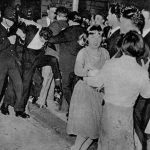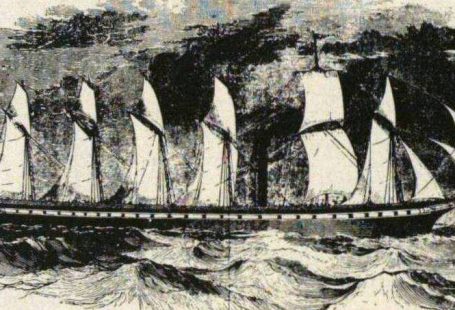This week we are delighted to welcome 69,150 brand new pages to The Archive, with the addition of one very special brand new title from London. Meanwhile, we have updated twelve of our existing titles, with updates to our newspapers from Scotland, Wales and England, as well as to one our of special political titles.
Meanwhile, this week marks 125 years since writer Oscar Wilde was released from prison, having been sentenced to two years’ hard labour for ‘gross indecency’ in 1895. So read on to discover all about our new and updated titles of the week, as well as to find out how newspapers from the time reported on the release of Oscar Wilde from prison.
Register now and explore the Archive
We’re excited to welcome this week’s sole new title, which is the wonderful Woodford Times, to our collection. Established in 1867 as a politically independent publication, the Woodford Times appeared every Saturday priced at one penny. Circulating in ‘London, Bow, Stratford, Leyton, Wanstead, Woodford, Walthamstow, Snaresbrook, Loughton, Chigwell, Chingford, [and] Epping,’ this newspaper was originally published by J. Jones and Sons from the High Street, Woodford.

The town of Woodford was originally part of the ancient county of Essex, but now is a part of Greater London. And its Victorian newspaper, which ran into the twentieth century, was an exceedingly thorough publication. Spanning eight pages, the Woodford Times reported on local, national and international news items, containing a ‘Summary of Passing Events,’ which included items like ‘Murder at Aldershot’ and ‘Female Pugilistic Encounter.’
Meanwhile, the Woodford Times contained a ‘Town Talk’ feature, which looked at the news from London, whilst also featuring a section entitled ‘American items.’ The newspaper also published an ‘Epitome of News.’ Filling a page, this section of the Woodford Times contained short summaries of news, each item described by one or two sentences. Furthermore, the Woodford Times contained special interest features, for example, incorporating a section called ‘Hints Upon Gardening.’
In addition to our splendid new title of the week, we have updated twelve of our existing titles. We have made additions to a duo of Scottish titles – the Glasgow Chronicle and the East Kilbride News – as well as to one of our Welsh titles, the Pontypridd Observer.

We have also made significant additions to Kent title the Herne Bay Press, a politically neutral title which was established in 1883 and promised to be an ‘outspoken monitor on local affairs,’ as well as offering ‘each week a record of the social life of the town, as portrayed by its various societies.’ We have added over 40,000 pages to this particular title over the past seven days. Other significant updates include the over 13,000 pages we have added to the Nottingham Evening Post, and the over 11,000 pages we have added to Lancashire title the Bebington News.

Finally, we have added the years 1916 to 1927 to our special Labour title Clarion, which was founded by Robert Blatchford and Alexander M. Thompson in Manchester in 1891. This publication took a refreshingly jovial approach to the serious business of politics, socialist writer and politician Margaret Cole observing how:
There never was a paper like it. It was not in the least the preconceived idea of a socialist journal. It was not solemn; it was not highbrow…It was full of stories, jokes and verses.
Indeed, Clarion became associated with a variety of non-political activities like handicrafts, rambling and cycling. The National Clarion Cycling club is still in existence to this day!
19 May 1897 – Oscar Wilde is Released From Prison
On 15 May 1897, a recently added page to the Herne Bay Press related how:
It is understood that Oscar Wilde will leave Reading Prison for Wormwood Scrubs on the 18th, and be released at an early hour on the morning of the 19th, the date on which his sentence expires.

This short notice belies an important moment in history: writer Oscar Wilde’s release from prison, two years after he was sentenced for ‘gross indecency,’ following the revelations of his relationships with Lord Alfred Douglas and other men.
Other newspapers in our collection contain further reports on Wilde’s release. The Evening News (London), two days before Oscar Wilde was freed, contained this report on the author’s ‘future plans,’ which was taken from the New York Journal:
Wilde says he has no intention of giving up literary work or of withdrawing from public life. He is well physically, though his brain feels rather tired, and accordingly he is going to rest for a short period in a place near London, that his friends alone know of. There he will mature his literary plans, which have not for the present assumed any concrete form. His writings will be in English, and not, as has been suggested, in French.

Meanwhile, famously radical and left wing newspaper Reynold’s Newspaper published a full account of Oscar Wilde’s release from Reading Gaol on 23 May 1897, from where he was ‘secretly removed’ on 18 May 1897. According to the article, Wilde was ‘in total ignorance of his imminent removal from Reading,’ and he went to bed early. However, he was woken at 8.30 p.m. and was ‘ordered to dress in the clothes in which he was sentenced.’
Once attired ‘in clothes of fashion – including the frock coat, silk hat, and patent leather boots,’ Wilde was taken to the main entrance of the prison, where he was met by a cab. The cab then drove him to Twyford Station, and he arrived at Westbourne Park at 10.40 p.m., the nearest station to London’s Wormwood Scrubs prison.

Reynold’s Newspaper also revealed how Oscar Wilde had spent his time in prison, relating how:
Whilst being in prison Mr. Wilde has bound four Bibles, and the one now being used for services in the prison chapel is said to have been rebound by him. He has rebound no end of hymn-books used by the prisoners. It is said that Mr. Wilde has become most expert in his adopted trade, and that he has been most happy in his occupation.
Again, the newspaper reported on Wilde’s supposed good health, writing how ‘he has never looked better or been more medically fit than he is at the present time.’ He was also supposed to be as mentally strong ‘and as active as in his most brilliant days.’ This was despite his experience of being put to work on the treadmill, known as the ‘golden staircase,’ when he was first imprisoned at Wandsworth.

Meanwhile, Oscar Wilde had bold ambitions for the future. Reynold’s Newspaper described how the author had ‘no intention of hiding himself and will resume his literary career, writing over his own name.’ It was said that he intended to go to Paris, and thence to the south of France.
Some weeks after his release, Wilde wrote a series of letters protesting at prison conditions in Britain, especially regarding the treatment of children within them. At his former place of imprisonment, Reading Gaol, the warder had been dismissed for giving an anaemic child a biscuit. On this subject, Wilde wrote the following letter to the Daily Chronicle, which was included in Reynold’s Newspaper on 30 May 1897:
I learn with great regret, through the columns of your paper, that the warder Martin, of Reading Prison, has been dismissed by the Police Commissioners for having given some sweet biscuits to a little hungry child. I saw the three children myself on the Monday preceding my release. They were quite small children, the youngest – the one to whom the warder gave the biscuits – being a tiny little chap, for whom they had evidently been unable to find clothes small enough to fit.

Wilde went on to comment:
I need not say how utterly distressed I was to see these children at Reading, for I knew the treatment in store for them. The cruelty that is practised by day and night on children in English prisons is incredible, except to those that have witnessed it, and are aware of the brutality of the system.
He went on to pen The Ballad of Reading Gaol whilst in France, but France for Wilde was a veritable exile. Suffering increasing ill health, and experiencing poverty, Wilde passed away in Paris on 30 November 1900.

New Titles
Title |
Years Added |
| Woodford Times | 1869 |
Updated Titles
This week we have updated twelve of our existing titles.
You can learn more about each of the titles we add to every week by clicking on their names. On each paper’s title page, you can read a FREE sample issue, learn more about our current holdings, and our plans for digitisation.
Title |
Years Added |
| Bebington News | 1989-1990, 1992 |
| Clarion | 1916-1927 |
| East Kilbride News | 1991 |
| Glasgow Chronicle | 1849 |
| Harlow Star | 1988, 1990 |
| Herne Bay Press | 1883-1897, 1899-1912, 1919-1975 |
| Nantwich Chronicle | 1995 |
| Nottingham Evening Post | 1995 |
| Oldham Advertiser | 1990, 1993 |
| Ormskirk Advertiser | 1990 |
| Peterborough Herald & Post | 1989 |
| Pontypridd Observer | 1962 |
You can keep up to date with all the latest additions by visiting the recently added page. You can even look ahead to see what we’re going to add tomorrow.






